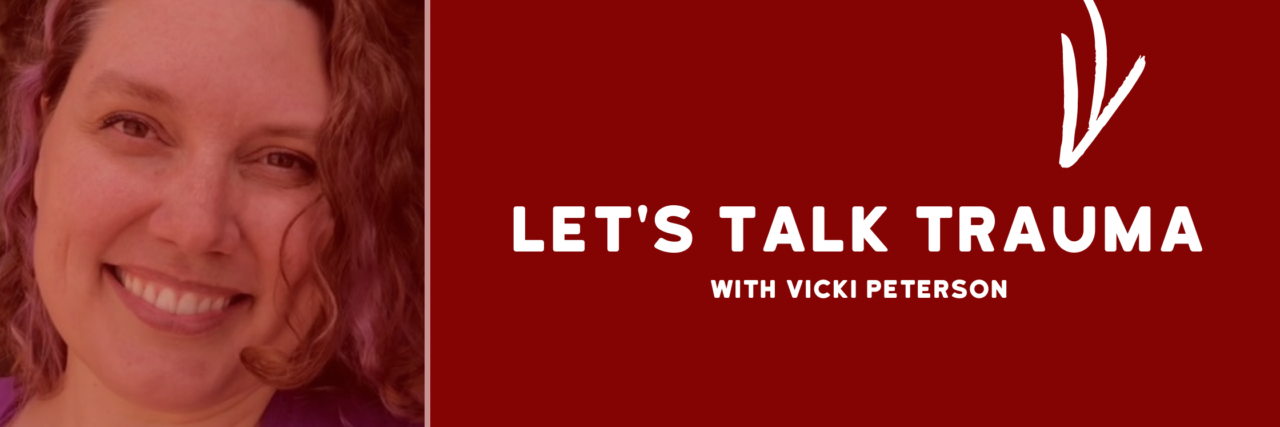Let's Talk Trauma: You May Never Be Completely Healed, And That's OK
Editor's Note
Follow Vicki’s weekly trauma column “Let’s Talk Trauma” by following her on The Mighty!
Dear, Vicki What does healing from trauma look like? Is it all the way to 100% healed or will it stay closer to 75% for the rest of my life?
Dear Tiffany,
Healing from trauma is a universal goal for humanity where no one is exempt. Trauma exists on a spectrum. While survivors of complex trauma and post traumatic stress disorder (PTSD) face multiple or unique challenges, pretty much everyone has “stuff” to process and transform, and everyone goes through some patches that are rougher than others. As the old idiom goes, if it’s not one thing, it’s another. Time and space are squishy things. Total enlightenment aside, no one is 100% healed from trauma 100% of the time. However, through the trauma recovery process, it is possible for trauma survivors to experience feeling 100% healed some of the time, and a little bit better healed 100% of the time.
Rather than a percentage, I like to think about measuring trauma recovery through growth over time. What have I learned? What am I in the process of learning right now? How often do I recognize and nurture my feelings and emotions? How often am I able to identify and communicate my own needs? Have I made lifestyle or relationship adjustments to better meet those needs? Are my choices healthier today than before? How much patience do I have for myself as I am healing and growing? How much compassion do I have for myself?
There are many types of trauma, but most long term traumas tend to be at least partly relational, or in other words, caused or made more intense through dysfunctional human relationships. For example, let’s say a kid falls and breaks her arm, and rather than being nurtured, gets yelled at by her mother for the inconvenience and expense of needing to go to the hospital. The physical trauma of the arm breaking is one thing, but the failure to receive nurturing in a vulnerable situation is more likely the root of long-lasting trauma that tends to get stuck in the mind and body needing to be healed long after the broken arm heals.
Trauma recovery is the process of feeling, then releasing painful emotions that are stuck in the brain and body. Depending on where you are in the journey, trauma recovery can sometimes feel worse before it gets better, especially if you have been dissociated or numb from feeling the depth of your sadness, anger, grief, terror or pain. Lots of previously trapped emotions tend to surface when people are actively working though the things that trigger them. Healing an emotional wound is similar to healing a physical wound. Cleaning out the area and applying first aid might hurt like heck, but it’s also exactly what’s needed for recovery. Allowing ourselves to face what terrifies us and feel the full range of our feelings can be daunting at first, but each time we create a safe space to process and allow ourselves to “go there,” the emotional charge lessens each time, and can eventually fade out entirely. Therefore, feeling sadness, anger, grief, terror or pain often equals amazing progress in trauma recovery, because you are doing the work!
Coping mechanisms such as denial, minimization, blame shifting or escapism might help someone feel “fine” short term, but inevitably prolongs the healing process. It takes a lot of patience and courage to confront a trauma that has been previously denied or minimized. It’s common for trauma survivors to return to the seemingly safer experience of denial, only to find it doesn’t actually make them feel any better. It’s also common for trauma survivors to plateau in their recovery work. Perhaps some healing has taken place, but the experience of feeling the full range of feelings all the time is too much, so the trauma survivor returns to more comfortable coping styles where things don’t feel so intense. Trauma recovery is difficult work, and sometimes taking a break from the intensity with the intention to return fully charged is the right choice for a while.
Sometimes, the circumstances for trauma recovery don’t line up. In order to safely and effectively process trauma, survivors need at least one trustworthy relationship with a loved-one or a therapist in a physical environment where they feel 100% safe. If a survivor needs to put trauma recovery on hold until they reach a point of total safety, that’s okay.
Trauma recovery does not mean you will never be triggered again. It does not guarantee a lifetime of safety or protection from abusive people. It does not mean you will feel eternally happy or fulfilled. Trauma recovery happens when you face a stress-inducing situation but find ways to manage your trauma responses a little better than last time. It happens when you choose courage over fear to make that necessary change in your life. It happens when you have that tough but honest conversation with a loved one. It happens when you identify and communicate your needs. It happens when you care for every aspect of yourself. It happens when you believe you are worthy of unconditional love, and continually find ways to be kinder, gentler, and more loving with yourself. It happens when you decide you are worth fighting for. To me, any percentage of growth in these areas is a major win.
Love,
Vicki
Click here to read more of Vicki’s Column “Let’s Talk Trauma: I’m Traumatized, Now What Do I Do?”
Lead image courtesy of the contributor

